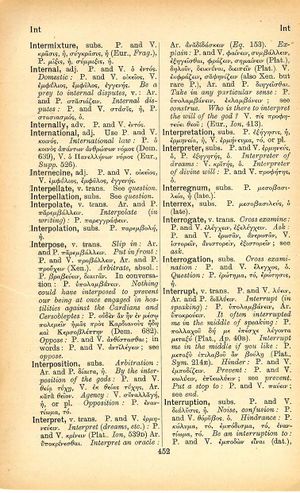interrex: Difference between revisions
καλῶς δρῶν ἐξαμαρτεῖν μᾶλλον ἢ νικᾶν κακῶς → I would prefer to fail with honor than to win by evil | I prefer to fail by acting rightly rather than win by acting wrongly | Better fail by doing right, than win by doing wrong (Sophocles, Philoctetes 95)
m (Text replacement - "link={{" to "link={{") |
m (Text replacement - "}}]]" to "}}]]") |
||
| Line 1: | Line 1: | ||
{{Woodhouse1 | {{Woodhouse1 | ||
|Text=[[File:woodhouse_452.jpg|thumb | |Text=[[File:woodhouse_452.jpg|thumb | ||
|link={{filepath:woodhouse_452.jpg | |link={{filepath:woodhouse_452.jpg}}]]'''subs.''' | ||
P. [[μεσοβασιλεύς]], ὁ (late). | P. [[μεσοβασιλεύς]], ὁ (late). | ||
}} | }} | ||
Revision as of 10:11, 15 August 2017
English > Greek (Woodhouse)
subs.
P. μεσοβασιλεύς, ὁ (late).
Latin > English (Lewis & Short)
inter-rex: rēgis, m.,
I one who held the regal office between the death of one king and the election of another; a regent, interrex, Liv. 1, 17; 1, 32.—
II During the times of the republic, one who held the supreme power from the death or absence of the chief magistrates till the election of new ones: L. Flaccus interrex legem de Sulla tulit, Cic. Agr. 3, 2, 5; id. Leg. 1, 15, 42; id. Dom. 14, 38: prodere, to nominate, appoint, id. Agr. 3, 2, 5: creare, Liv. 5, 31, 8: infestam patribus plebem interreges cum accepissent, id. 7, 21.
Latin > French (Gaffiot 2016)
interrēx,¹¹ ēgis, m., interroi : a) magistrat qui gouvernait jusqu’à la nomination d’un roi : Liv. 1, 17, 10 ; 1, 32, 1 ; b) sous la républ., jusqu’à l’élection des consuls nouveaux : Cic. Agr. 3, 5 ; Leg. 1, 42.
Latin > German (Georges)
inter-rēx, rēgis, m., der Reichsverweser, Interrex (s. inter-rēgnumdas Nähere), Sall. fr., Cic. u. Liv.: interregem prodere od. creare, ernennen, wählen, Cic. u. Liv.

